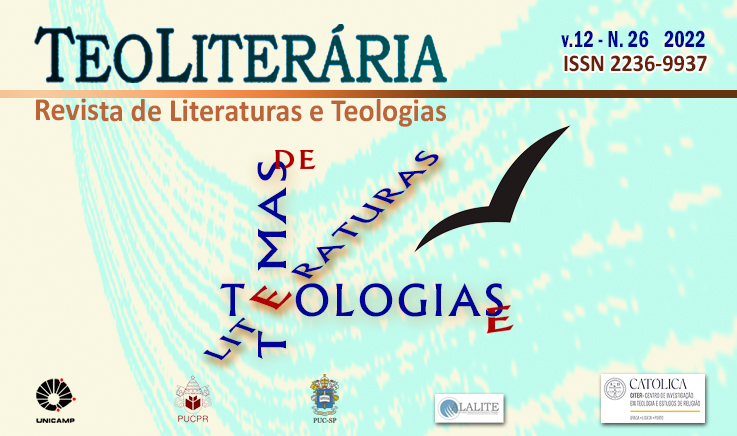Pact and Exorcism in the cordel ‘The Woman who deceived the Devil’
DOI:
https://doi.org/10.23925/2236-9937.2022v26p122-150Keywords:
Cordel, Devil, Exorcism, Pact with the Devil, TheopoeticsAbstract
This paper intends to show a possible understanding of pacts with the Devil and exorcisms since the colonial period and to situate this mentality present in cordel ‘The woman who deceived the Devil', by Manoel D'Almeida Filho. The objective is to analyze the pacts made with the Devil and to verify the inversion of power between the woman and the Devil, who is exorcised at the end of the narrative. The theoretical referential of Laura de Mello e Souza corroborates the discussion and comprehension of the colonial historical context, a period in which the mentality of pacts with the Devil and exorcisms populated the popular imaginary. Theopoetics is the understanding bias of this work. Antônio Carlos Magalhães and Salma Ferraz provide the theopoetic backdrop for this study and help in the approximation between theology and literature. The methodology chosen is bibliographic research, promoting the understanding of the cordel imaginary about pacts and exorcisms and the analytical reading of the chosen leaflet. A possible form of cultural and literary, imagistic and spiritual exorcism of the Devil appears as a result of the deception promoted by the woman, and is established through humor, pilhery and ridicule applied to the Wicked One.
References
ACADEMIA BRASILEIRA DE LITERATURA DE CORDEL. Disponível em: <http://www.ablc.com.br/>. Acesso em setembro de 2016.
ALMEIDA FILHO, Manoel d’. A mulher que enganou o Diabo. São Paulo. Editora Luzeiro Limitada, 1986.
ANDERS, Valentim. et al. (2001-2021). Etimología de Exorcismo. Disponível em: <http://etimologias.dechile.net/?exorcismo>. Acesso em: 07 jul. 2021.
FERRAZ, Salma. As malasartes de Lúcifer: Textos críticos de teologia e literatura. Londrina: EDUEL, 2012.
FUNDAÇÃO CASA RUI BARBOSA. Disponível em: <http://www.casaruibarbosa.gov.br/cordel/acervo.html>. Acesso em setembro de 2016.
GÊNESIS. In: Bíblia Católica Online. Capítulos 1 – 3. Disponível em: <https://www.bibliacatolica.com.br/biblia-ave-maria/genesis/>. Acesso em junho de 2020.
LEERS, Bernardino. Rigorismo moral e humor popular. São Paulo: Paulinas, 2007.
LEWIS, Clive Staples. The Screwtape Letters: Cartas de um diabo a seu aprendiz. Tradutor: Lemos, Juliana. Editora: WMF Martins Fontes. Edição: 2. São Paulo. 2009.
MAGALHÃES, ACM.; BRANDÃO, E. O Diabo na arte e no imaginário ocidental. In: MAGALHÃES, ACM., et al. (org.). O demoníaco na literatura [online]. Campina Grande: EDUEPB, 2012. pp. 277-290. ISBN 978-85-7879-188-9. [E-book].
MAGALHÃES, Antônio Carlos de Melo. Deus no espelho das palavras: Teologia e literatura em diálogo. 2ª ed. São Paulo: Paulinas, 2009.
MAIOR, Mário Souto. O diabo na cultura popular. Publicado na Revista Ele Ela n. 75 de julho de 1975. Disponível em: <http://www.soutomaior.eti.br/index.php?option=com_content&view=article&id=48&Itemid=14>. Acesso em: 24 jul. 2021.
MATOS, Edilene. O imaginário na literatura de cordel. Salvador: Edições Macunaíma, 1986.
MURAD, Afonso. O trem da mariologia. Vídeo 2: Introdução à Maria na Bíblia. In: <http://afonsomurad.blogspot.com/search/label/Trem%20da%20mariologia>. Canal Youtube: 14 out. 2011. Disponível em: <https://www.youtube.com/watch?v=k2uUdKlOjKw>. Acesso em: 07 jul. 2021.
NAVES, Alair Matilde. Representações do diabo no cordel de Manoel D’almeida Filho. Dissertação (Mestrado). Belo Horizonte: Departamento de ciências da Religião da Pontifícia Universidade Católica de Minas Gerais, 2019.
NOGUEIRA, ID.; SILVA, AH. Termos e expressões do coloquial do cotidiano da zona rural no Brasil central no século XX / Ismael David Nogueira. Goiânia: Gráfica UFG, 2017. 157p.
SOUZA, Laura de Mello e. O diabo e a terra de santa cruz: feitiçaria e religiosidade popular no Brasil colonial. – São Paulo: Companhia das Letras, 1986.
Published
How to Cite
Issue
Section
License
Copyright (c) 2022 Teoliteraria - Journal of Literatures and Theologies (On Line) ISSN 2236-9937

This work is licensed under a Creative Commons Attribution 4.0 International License.
TeoLiteraria – Journal of Literatures and Theologies owns the copyright of all published material. The whole reproduction of the articles of this Journal in other publications or for any other purpose, by any means, requires a written permission of the editor of this journal. Partial reproductions of articles (abstracts, more than 500 words text, tables, figures and other illustrations) must have a permission written by the publisher and the authors.

